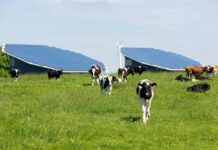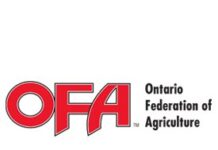by Peggy Brekveld,
President, OFA
Canada’s federal, provincial and territorial ministers of agriculture get together once a year to discuss issues that are important to our sector across the country. Their most recent meeting just took place in New Brunswick, immediately following the summer Board meeting of the Canadian Federation of Agriculture (CFA), which brought together farm leaders from across Canada, including the Ontario Federation of Agriculture (OFA).
This was also an opportunity for the CFA to host its annual federal-provincial-territorial agriculture ministers’ roundtable to provide ministers with farmer perspectives on issues like the proposed national Sustainable Agriculture Strategy, the financial health of farm businesses and the industry-led Grocery Sector Code of Conduct.
As farmers, we know that one of the key pieces of any sustainability strategy for agriculture means making sure that we’re talking about more than just the environment. The economic and social pillars of sustainability are just as important – critical, in fact, to making sure that the investments needed for environmental sustainability are possible.
Economically, we need business risk management programs to provide the support we need to address the risks that naturally come with farming, and a regulatory environment that is responsive, representative of the modern needs of our sector and doesn’t place our farmers at a competitive disadvantage compared to their international counterparts.
We also want to see that markets are fair, whether through our international trade agreements or in our domestic markets through the new Grocery Sector Code of Conduct that is currently in development and slated for implementation by the end of the year.
Socially, we need our rural communities to be healthy. Farmer mental wellness matters as that’s the key to our sector’s future – simply put, we can’t farm without farmers. Social sustainability also means protecting and strengthening our food security to ensure that Canadians continue to have access to affordable, high-quality food and that we protect our ability to grow, raise and produce as many different farm products as possible right here at home.
Equally, our environment needs to continue to be healthy. More than most people, farmers depend on the weather and on healthy soils and clean water for their livelihoods. We’ve long been committed to reducing our environmental footprint and working to leave our farms to the next generation of farmers in better condition than when we took them over at the start of our farming careers.
There are, of course, many more ways that agriculture can continue to make its environmental footprint even better, from precision farming technologies that reduce our fertilizer use, and plant breeding that produces more disease resistant and drought tolerant crops to smart irrigation systems and automated tools and equipment that can help reduce the labour shortage on our farms.
Governments of all levels can support the environmental, economic and social sustainability of the farming sector by helping to fund initiatives and programs of all kinds that are broader and more costly than individual farmers can afford to pay for on their own.
Some of these are already being addressed through the newest federal-provincial agricultural policy framework, the Sustainable Canadian Agricultural Partnership. In Ontario, for example, the federal and provincial governments just recently announced funding for three programs under the Ontario Agricultural Sustainability Initiative that will help farm businesses be more productive and resilient.
Here in Ontario and nationally, there will also continue to be conversations around other important issues like animal health and biosecurity, international trade and emissions reductions and it’s important for farmers to continue to be included in those discussions so that new strategies, policies and legislation will work for all involved and help ensure a sustainable future for the sector.


